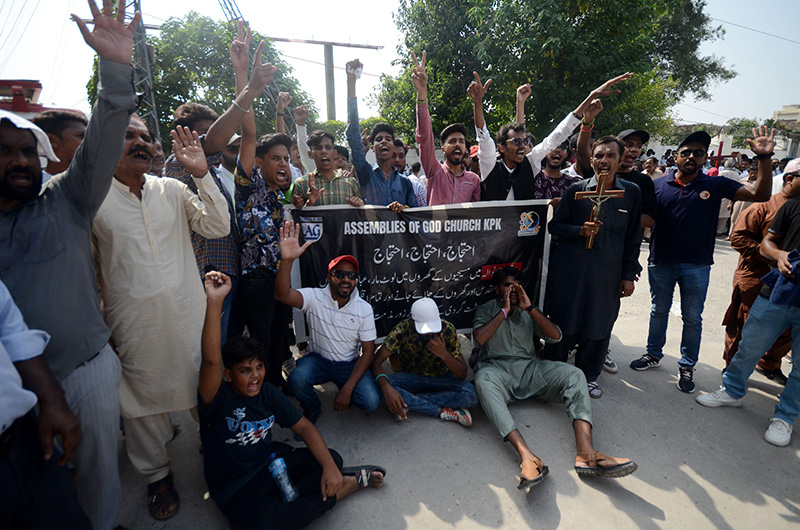Attacks, described by Catholic bishops as “the worst incident against Christians in the history of Pakistan”, have reignited questions about the safety of one of the country’s most vulnerable minority groups, and have challenged the authorities to do more to ensure religious rights are protected.
Up to 25 churches and chapels, as well as hundreds of Christians’ homes, were ransacked and torched in a single day when a mob of hundreds carried out attacks in the town and district of Jaranwala. Those present that day – 16 August – have described the use of sophisticated weaponry as well as highly flammable chemicals, which burn at extremely high temperatures. Video footage emerged showing the systematic desecration of Christian graves, bibles and statues as well as the burning of official Church documents including baptism, marriage and death certificates.
In the wake of these attacks, the authorities were quick to show solidarity with the victims, and assure them that swift and decisive action would be taken. Visiting Jaranwala within days of the atrocity, caretaker Prime Minister Anwaar-ul-Haq Kakar provided compensation to about 100 of the worst-affected families, and sought to allay their fears, saying that “it is the responsibility of the government to ensure the safety of every citizen”. Within 24 hours of the attacks, reports emerged that the police had arrested nearly 150 people in the Punjab province, and that more than 6,000 police and paramilitary troops had been deployed to restore law and order.
However, profoundly shaken and traumatised by the attacks, Christians in Jaranwala are far from reassured. While there have been several acts of large-scale violence against Christian communities in Pakistan over the last 25 years, the Jaranwala atrocity could be considered the most serious, due not only to the large geographic spread of the attacks, but also the apparent premeditation that underlies them.
Speaking to Catholic charity Aid to the Church in Need (ACN), which supports persecuted and other suffering Christians, Fr Emmanuel “Mani” Yousaf, national director of the Catholic-run National Commission for Justice and Peace, said: “The attacks took place over an area spanning up to 15 miles.” He added: “Everything we know about what happened that day shows that it was premeditated – those behind it had discussed it and worked out exactly what they were going to do.”
Other evidence points to the collusion of local inhabitants amid reports of announcements blaring from mosque loudspeakers calling on Christians to leave the district without delay or risk being burned alive in their homes. While some Muslim neighbours were clearly horrified about what was happening to local Christians, others seemed to take a different view. Lay Christian leaders told ACN that some Muslims in Jaranwala participated in the attacks and said that the careful targeting of homes belonging to Protestants and Catholics alike could not have taken place without the intelligence provided by local people. Other lay leaders described visiting Jaranwala the day after the attack and being met by resistance from local Muslims. One Christian layman told ACN: “When we went in, local Muslims stopped and stared wide-eyed and began cursing us and using abusive language.”
The Jaranwala atrocity has prompted fresh debate about the efficacy of security measures and other initiatives undertaken in the wake of similar attacks on Christians, such as the 2009 incident in Gojra, also in the Punjab province, and the 2013 violence in Joseph Colony, Lahore. As with Jaranwala, the pretext for these acts of violence was an allegation of blasphemy levelled against Christians. Not only were the Jaranwala victims set upon by the mob, but in both cases the perpetrators broadened their attack to all Christians in the vicinity. And in both cases, questions were asked about the response of the police, with some going as far as to accuse some in the security forces of colluding with the attackers.
Similarly, the Gojra and Joseph Colony incidents prompted criticism of Pakistan’s failure to clamp down on flagrant abuse of the country’s blasphemy laws, where mobs presume an individual’s guilt and carry out “summary justice”. Reflecting a deeply felt sense in the Christian community that nothing has changed in Pakistan in the wake of such attacks, Archbishop Benny Travas of Karachi said immediately after the Jaranwala incident: “An alleged ‘desecration of the Holy Qur’an’, that has yet to be investigated, led to an open act of violence against the entire Christian community residing at Jaranwala … Once again, we have the same old condemnations and visits by the politicians and other government officials expressing their solidarity with the Christian community and promises that ‘justice will be done’, but in reality, nothing materialises, and all is forgotten.” The archbishop added: “We as a Christian community have time and again displayed our loyalty to Pakistan, yet incidents like … Gojra, Joseph Colony and now Jaranwala show that we are in reality second-class citizens that can be terrorised and frightened at will.”
The presence of 1,000 people protesting outside the UN headquarters in New York on 25 August urging a worldwide response to the Jaranwala incident demonstrates a lack of confidence in the Islamabad government’s commitment to ensure such actions never happen again. Fr Bonnie Mendes, a priest from Faisalabad, the diocese that incorporates Jaranwala, was among many to call on the international community to, as he put it, “put pressure” on the government of Pakistan to make good their promises to stamp out such violence and tackle the causes of it.
While the political debate rages about turning words of compassion into swift and decisive action, one thing can be relied on: that, despite fears for their safety, the Christians of Pakistan will remain steadfast in their faith. This is reflected in the experience of staff from Aid to the Church in Need who have gone to meet survivors of persecution in Faisalabad and elsewhere, and heard them witness to Christ, despite huge pressure to abandon their faith.
Circulating online are many testimonies of faith from Christians from Jaranwala, including one from a small boy who recalled how he was told that if he had converted to Islam, his house would never have been set ablaze. The boy said he had responded: “So my house has been burnt down, that’s fine - but I can’t let my faith burn down by reciting the Shahada [profession of Islamic faith].”
John Pontifex is Head of Press & Public Affairs, Aid to the Church in Need (UK)



 Loading ...
Loading ...
What do you think?
You can post as a subscriber user ...
User comments (0)